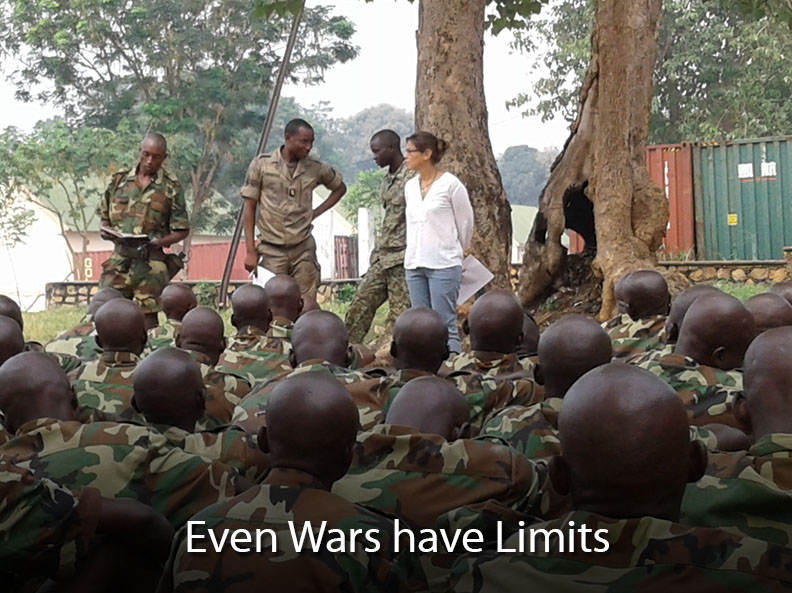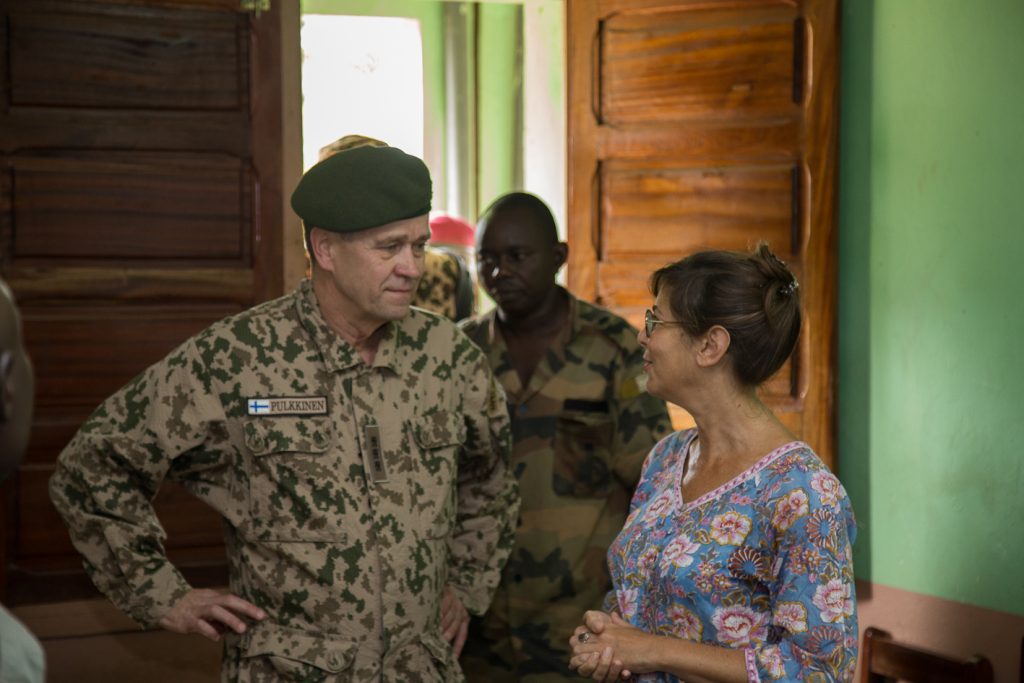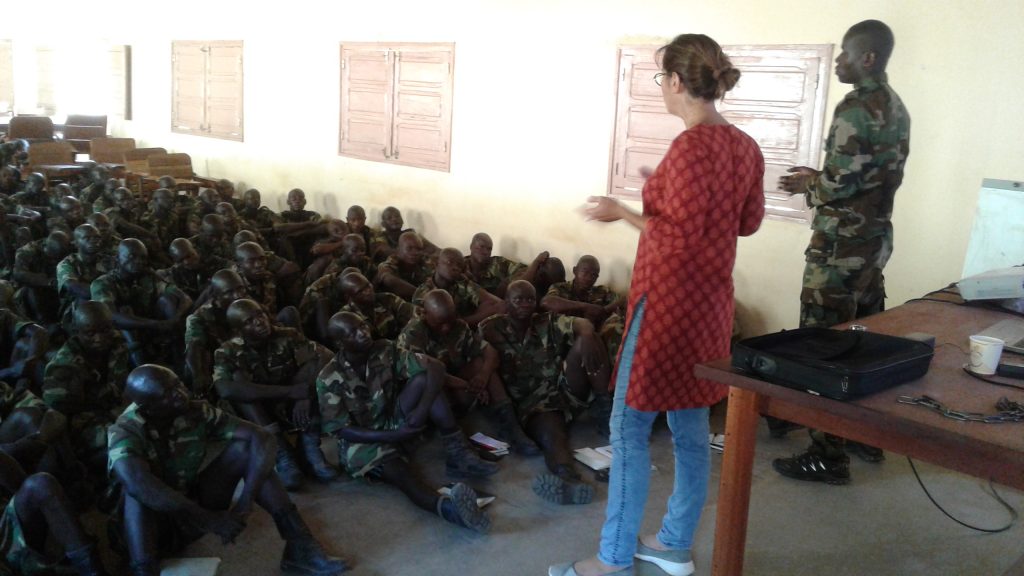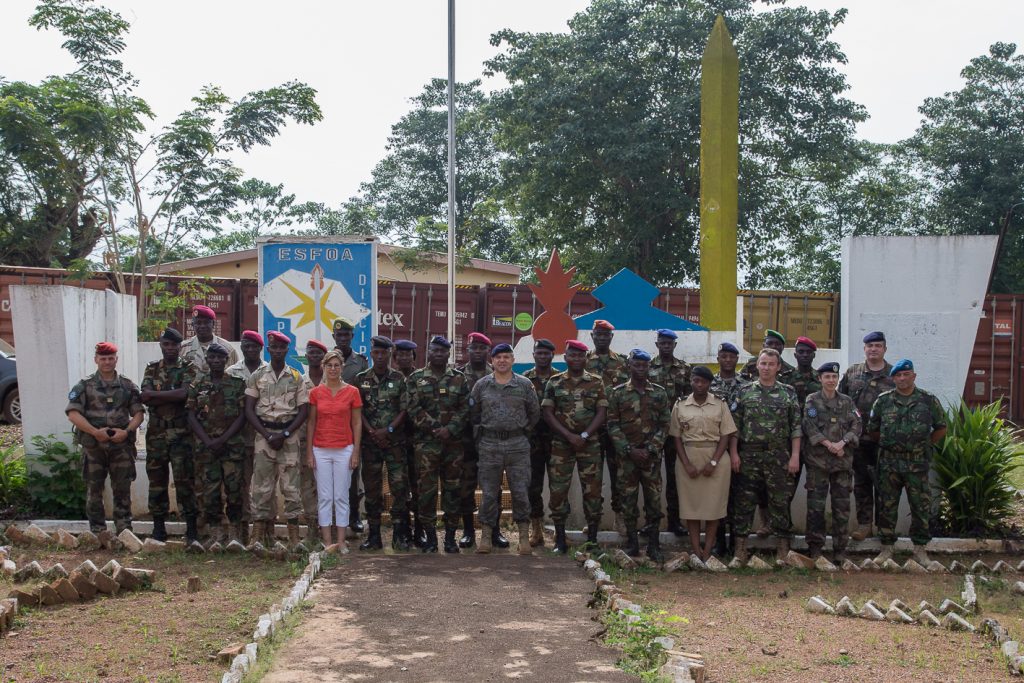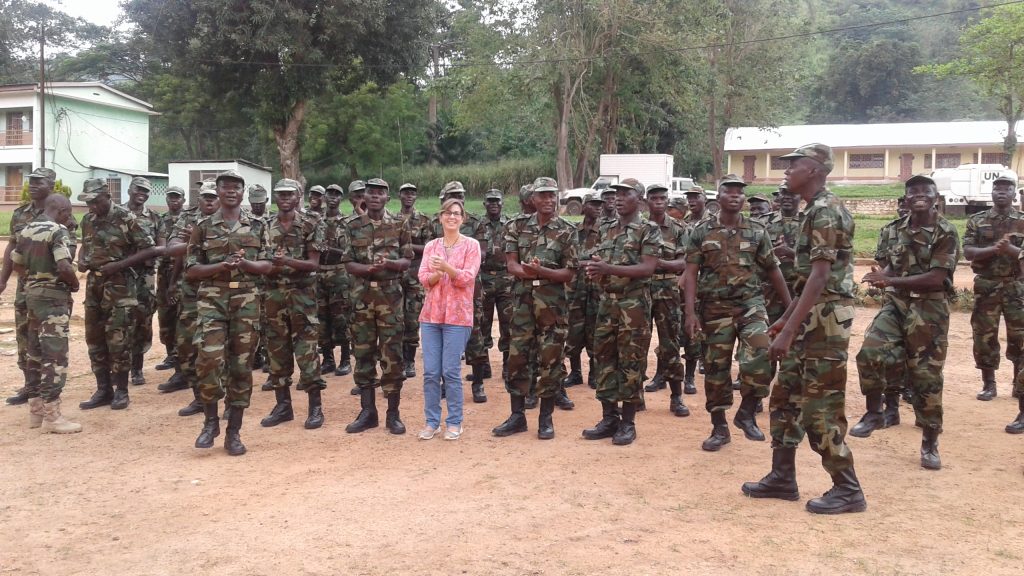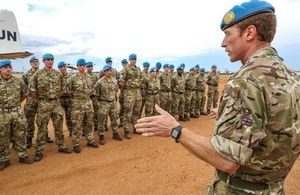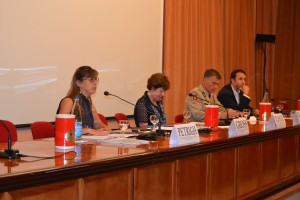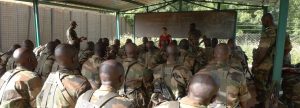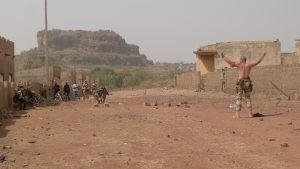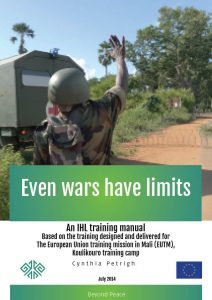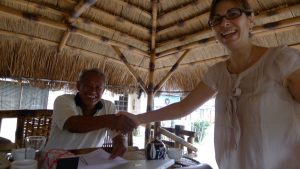Beyond peace specializes in training armed forces and non-state armed groups on the Law of armed conflict (LOAC), the prevention of sexual violence (PSV) to ensure their their behavior, their efficacy and their reputationand meets standards of excellence and complies with international norms.
Our expertise and our added-value in this field, comes from:
- rapid and in-depth assessment of legal, operational and cultural context and applicable law
- production of customised training curriculum adapted to operational environment, specialties and ranks
- close collaboration with military commanders and trainers
- comprehensive methodology: lectures, questions/answers sessions, group work, digital and interactive platforms, dialogue and exchanges. The rules learnt through this interactive methodology are then practiced during combined tactical exercises (table-top and on the ground)
- monitoring and evaluation of progress
- train the trainer programme to ensure sustainability
Our clients include: UK MoD, EUTMs, Peacekeeping institutions (Malaysia peacekeeping centre, MINUSMA, Vietnam peacekeeping department) as well as non-state armed groups (Moro islamic Liberation Front in the Philippines).
Below are some stories.
We have just completed a 6-month pilot project in Central Africa, aiming at training the Central African Armed forces (FACA) on International humanitarian law (IHL) and prevention of sexual violence. The project was implemented through a partnership with the EU training mission (EUTM) in CAR with the support of UK government.
We were able to successfully design and establish the component. We have trained some 900 personnel: 1 infantry battalion, Officers on Leadership courses, NCOs, specialised staff (platoon Commander course; Intel course; CAT 2 course); former insurgents and instructors.
Our training is based on a contextual analysis and it is tailored to the audience and to the operational, legal and cultural context. It utilises a comprehensive methodology:
Below are some of the stories and the people behind this training project.
- Infantry Battalion
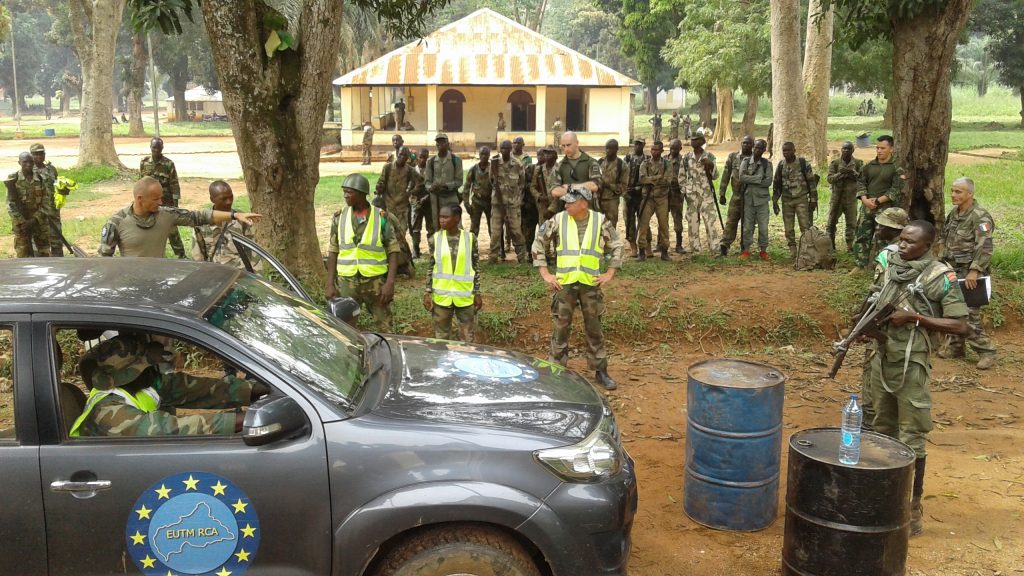 Photo: joint checkpoint exercise where the FACA learn about securing and respecting human rights
Photo: joint checkpoint exercise where the FACA learn about securing and respecting human rights
We have trained the 2 Companies of Infantry Battalion 1, currently trained by the EUTM. In addition to classroom sessions, group work and “sandbox” exercises, we were able to introduce a new tool through joint, IHL-military tactical exercises. All four Companies of BIT 1 participated in the exercise. We held briefing sessions with the Battalion Officers and the General Staff.
At the question “what did you learn from this training?”, a Corporal answers: “we are learning the difference between a professional military and bandits”.
“Your tactical exercises are adapted to our realities. You know our dilemmas and you are really here to support us”, says a Sergeant.
2. The former insurgents
Beyond peace contributed to the training of 100 former insurgents who have joined the Central African Armed forces (FACA) as part of the Demobilization, Disarmament, Rehabilitation and Repatriation (DDRR) project. The President’s initiative, which was joined by the armed groups and endorsed by the international community, provides a sign of hope and dialogue across the conflict divide.
We worked first, in October, with the 10 Officers and NCOs in charge of supervising the new recruits. In November, we started training the team of 100, with their support.
The former insurgents come form various rebel groups; they belong to different religious backgrounds; about 10% are female. They display an incredible willingness to learn and to amend their lives. This morning, I was showing videos about conflict-related sexual violence, in CAR and in other countries. One of them raised their hand: “We have our share in what happened, he said. But now that we are being educated and we understand our duties, we will not do it anymore. We will protect women against this crime. We will report abuse.”
As for the other members of the armed forces, the course looks at the basic principles of IHL (such as: distinction, proportionality, precaution); the protected persons and sites; the need to protect and respect women; the prohibition of torture, arson, pillage, rape; the treatment of prisoners; the roles of duties of military and criminal and military sanction processes.
3. Educating Officers
We contributed to the 2 Leadership training courses organised this semester by the Central African MOD in partnership with the EUTM. Some 65 Lieutenants educated abroad benefitted from these courses and learnt and shared about their duties and responsibilities as FACA. “We learnt that we cannot rape. We never knew that”, said one of the Officers.
“We learnt that when an operation is likely to result in failure and in a massacre, we should postpone it and better prepare it”, said another Lieutenant. “I had never thought of that. We are learning”.
4. Platoon Commanders’ Course
We co-facilitated this 12-week course together with Lieutenant Zandanga from the FACA. It was a wonderful experience and a privilege to work along such a skilled and committed instructor.
“We love this course because of its unique methodology. We learnt a lot and it’s fun”, said one participant.
5. Train the trainers
As much as this pilot project is successful, it has its limitations because it is a private initiative, limited in time. In order to ensure some degree of sustainability to our project, and in recognition of the great capacities and cooperation from the Central African military, we have trained 8 new IHL/PSV instructors. We benefitted from the outstanding support from UN OCHA and from the FACA through Lieutenant Zandanga for this activity.
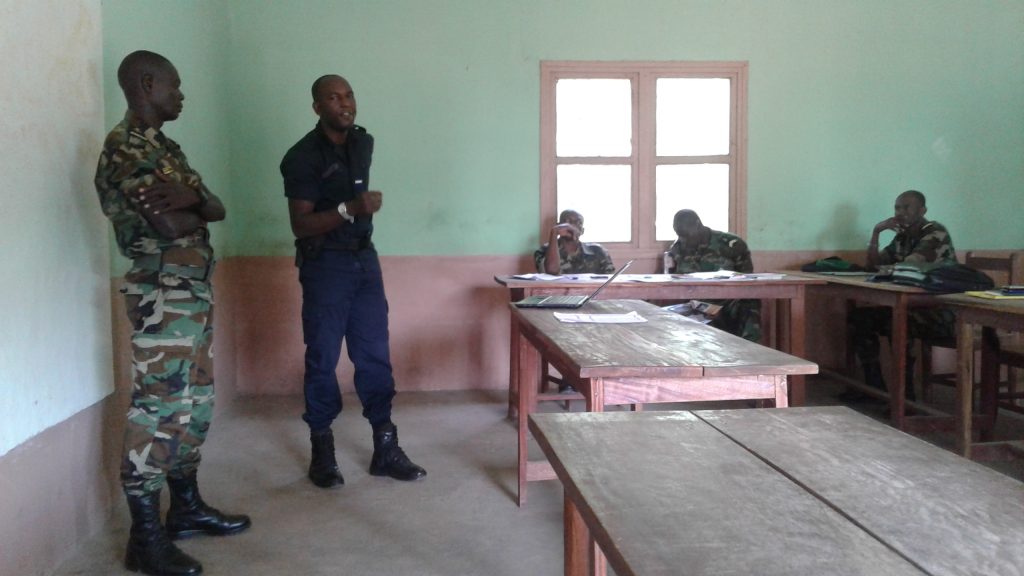
Photo: Lieutenants Dikossou and Lapo delivering a training on Protection of women and prevention of sexual violence: “women are the pillars of society; we, military, have to protect them”.
We can certify that these instructors are competent and committed and we wish them all the best in their new assignments as instructors.
6. What next?
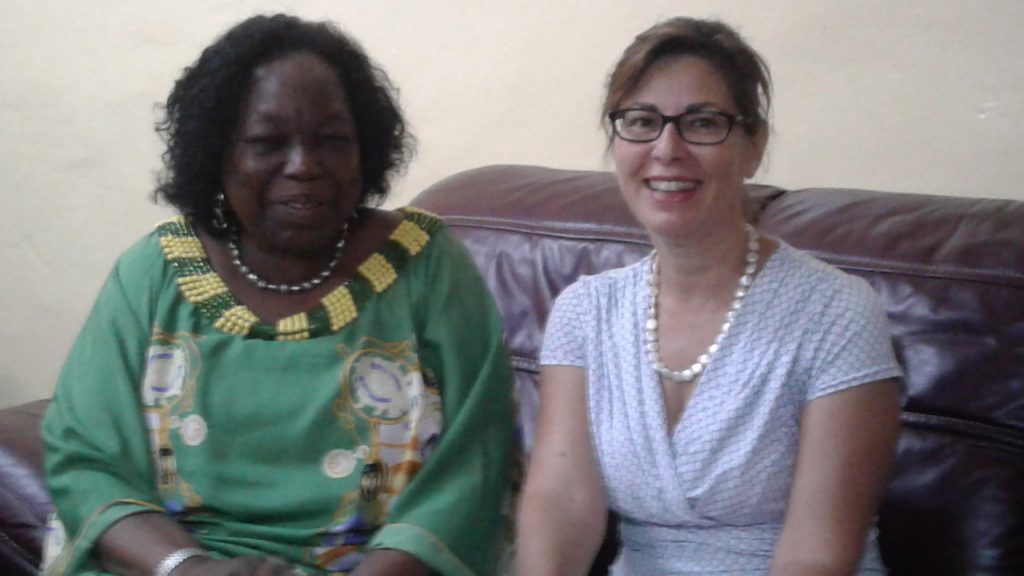
The Minister of Defense granted us two private audiences and in December expressed the wish that Beyond peace continues training the FACA. “Our military need to improve their behaviour before they are deployed. What you bare doing is essential and successful.”
We were privileged to receive wonderful support from the highest authorities and excellent cooperation from the FACA. The President of National Assembly received us on 21 December and also extended his support: “I congratulate you. You are an experienced woman. Your approach is the best we can have in this situation. Without ethics, we train brutes”.
The pilot project is a success. It was designed and managed by Beyond peace, thanks to the endorsement from the highest CAR authorities and support from the UK Government. What would be needed to systematise this component in EU CSDP missions? We will be holding a series of meetings in 2018 in order to share ideas and findings to this effect. Contact us to find out more or to participate: cynthia.petrigh@gmail.com
***
Beyond peace works regularly with the UK armed forces as a Gender adviser. Our work includes:
- Advising on gender mainstreaming and implementation of the Women, Peace and Security agenda, on which the UK is leading;
- Teaching and training at Srivenham military academy (since 2016) and in the Understanding and Working with the Military training (for UK civil servants)
- Participating in military exercises and mission rehearsal exercises for deploying troops: UK Joint Horizon, OP Trenton (deploying to South Sudan UNMISS)
***
San remo IIHL / US Africom
Beyond peace works with the US Africa Command on accountability for Commanders of African units deployed to UN peacekeeping missions. We participated in the African accountability workshops organised by the US Africom and the San remo Institute of International law in 2014 and 2016.
Beyond peace contributes to the work of the San remo Institute of humanitarian law (IIHL). In addition to her role as the former Director of the Refugee Law Course, Founder Cynthia Petrigh, who is a member of the Institute, is regularly invited to participate in reflection and debates, such as the San remo annual Round-Table on current issues of IHL.
***
Training the Malian armed forces (FAMA) at EUTM Mali
“We understood the difference between a professional Army and a group of bandits” – a soldier
Beyond peace Cynthia Petrigh designed and implemented the IHL/human rights/PSV training package for the EUTM mission in Mali. We trained 2,700 troops and officers during this UK seconded deployment which took place from June 2013 to June 2014. During this time, we developed lectures, drills, evaluations, as well as training for the European training officers, for increased cohesion, effectiveness and multiplying effect.
Challenges facing the FAMA (such as dealing with civilian riots; handling vulnerable persons at checkpoints; behaving in a professional manner in a context of fear and revenge) were integrated in the tactical exercises with the cooperation of the EU military trainers.
Dissemination
The Malian experience was shared with a number of specialized audiences. We were invited by the Swedish armed forces and the Nordic Centre for Gender in the Military to share our experience and findings, in September 2014, ahead of the deployment of Swedish troops to MINUSMA. A hearing was organised at Whitehall for the different Government agencies to discuss the IHL/PSV training of the FAMA program and its policy implications.
In The Hague, meetings were organised by GPPA with civil society as well as with the Swedish armed forces, who are deploying troops to the MINUSMA. In Belgrade,
We edited and published a training manual based on our experience in Mali with the EUTM. This manual explains the methodology which was developed specifically for the Malian troops and which was used to train more than 3,000 troops. The manual is available for free download on this website.
***
Working with non-state armed groups (NSAG)
We have been working with the Moro Islamic Liberation Front (MILF) in different capacities for several years.
While our Founder Cynthia Petrigh worked closely with the MILF negotiating panel in her role as a member of the international Contact Group for the peace talks on Mindanao (ICG) in 2009-2010 and with the Bangsamoro Islamic Armed Forces (BIAF) and their Ceasefire component during her tour as the Head of IHL/Human rights component of the ceasefire monitoring mission in 2011-2012, we continued our engagement with the MILF.
Beyond peace conducted a mission to Mindanao in February 2016 to meet with the political and military leadership of the Moro Islamic Liberation Front (MILF). We discussed with the MILF training needs for the Bangsamoro Islamic Armed forces (BIAF) in the context of the transformation.
In 2015, we visited Mindanao on behalf of a short mission with Swiss NGO Geneva Call to bring support on the content and the methodology of workshops with the Moro Islamic Liberation Front (MILF) on the prohibition sexual violence.
Beyond peace conducts confidential work with other NSAG in Asia and in Africa on compliance, ceasefire monitoring and support to mediation processes.

